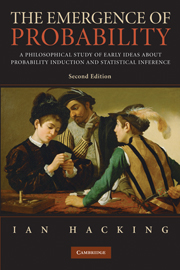 The Emergence of Probability
The Emergence of Probability Book contents
- Frontmatter
- Contents
- Introduction 2006
- 1 An absent family of ideas
- 2 Duality
- 3 Opinion
- 4 Evidence
- 5 Signs
- 6 The first calculations
- 7 The Roannez circle (1654)
- 8 The great decision (1658?)
- 9 The art of thinking (1662)
- 10 Probability and the law (1665)
- 11 Expectation (1657)
- 12 Political arithmetic (1662)
- 13 Annuities (1671)
- 14 Equipossibility (1678)
- 15 Inductive logic
- 16 The art of conjecturing (1692[?] published 1713)
- 17 The first limit theorem
- 18 Design
- 19 Induction (1737)
- Bibliography
- Index
17 - The first limit theorem
Published online by Cambridge University Press: 05 April 2013
- Frontmatter
- Contents
- Introduction 2006
- 1 An absent family of ideas
- 2 Duality
- 3 Opinion
- 4 Evidence
- 5 Signs
- 6 The first calculations
- 7 The Roannez circle (1654)
- 8 The great decision (1658?)
- 9 The art of thinking (1662)
- 10 Probability and the law (1665)
- 11 Expectation (1657)
- 12 Political arithmetic (1662)
- 13 Annuities (1671)
- 14 Equipossibility (1678)
- 15 Inductive logic
- 16 The art of conjecturing (1692[?] published 1713)
- 17 The first limit theorem
- 18 Design
- 19 Induction (1737)
- Bibliography
- Index
Summary
Chapter 5 of Part IV of Ars conjectandi proves the first limit theorem of probability theory. The intended interpretation of this result is still a matter of controversy, but there is no dispute about what Bernoulli actually proved. He takes for granted a chance set-up on which he can make repeated trials. There is a constant unknown chance p of ‘success’ S on any given trial. When n trials are made a proportion sn of successes is observed. Bernoulli proves what is now called the weak law of large numbers: the probability of an n-fold sequence in which ∣p − sn∣<ε increases to 1 as n grows without bound. Moreover, for any given error ε, he shows how to compute a number n such that the probability of getting sn in the interval [p − ε, P + ε], itself exceeds any given probability 1 − δ. In particular, if (1 −δ) = 0·999, we have a moral certainty that sn will fall in the assigned interval. For example if p is 3/5 then a moral certainty of error less than 1/50 is guaranteed by an n in excess of 25 550.
Bernoulli's proof is chiefly a consequence of his earlier investigation of combinatorics, for it proceeds by summing the middle terms in the binomial expansion. Notice that this result is a theorem of pure probability theory, and holds under any interpretation of the calculus. There is a familiar frequency interpretation of the weak law of large numbers.
Information
- Type
- Chapter
- Information
- The Emergence of ProbabilityA Philosophical Study of Early Ideas about Probability, Induction and Statistical Inference, pp. 154 - 165Publisher: Cambridge University PressPrint publication year: 2006